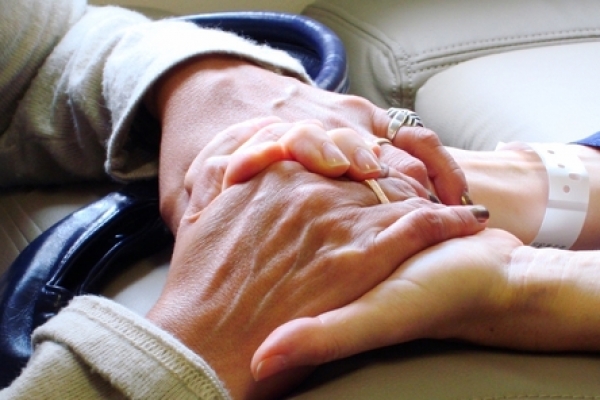Two jobs are unlikely to be automated in the foreseeable future – classroom teaching and caregiving. While the former prepares the future generation, the latter takes care of the present. These professions conjoin at the intersect of human and technical skills, and, require continuous improvisation as per the need of the student or patient. There is a huge gap prevalent in India in the field of caregiving. While the senior citizen population is projected to increase to 19% from 8%, there has been no apparent increase in the number of trained caregivers. The Indian government, under Health Sector Skill Council (HSSC) has set forth to create curricula, General duty Assistant (GDA), and Home Health Aide (HHA) as per the needs of the elderly patients. Even though the State and Central governments have contributed financially to support such initiatives, the scenario today is not very conducive.
Caregiving is generally handled by the paramedics who form the primary support for the patient during recovery and rehab, and, home caregivers help in a variety of ways such as running errands, household chores, and, intimate tasks such as personal hygiene. They are also responsible for monitoring, managing and, improving the health and well-being of their clients. Even though nurses take care of medication and other clinical needs, caregivers, through their care and companionship, enhance the speed of recovery as well as the state of well-being.
The caregiver workforce in India is highly fragmented, and, until now, caregiving was not seen as a career option. India has a long way to go before it can vouch itself as a health-secure country with a skilled workforce. According to a recent survey by Aspiring Minds, an employability assessment company, nearly 45 per cent of the nursing candidates who underwent skill training in India lack the proper knowhow to carry out daily care activities. The survey has also stated that 40 per cent of the candidates who graduated from the training programme do not know how to handle even the basic medical equipment such as a thermometer. The report, based on a study conducted on 3,000 candidates, citing WHO data, has said that the country is in need of 2.4 million nurses.
In Quotes “According to a recent survey by Aspiring Minds, an employability assessment company, nearly 45 per cent of the nursing candidates who underwent skill training in India lack the proper knowhow to carry out daily care activities.”
Challenges faced by caregivers
The caregivers face challenges at three levels: -
1. Job finding: There is no demand discovery platform. Caregivers do not know where to find the next job after their current patient has recovered. Moreover, caregivers struggle due to lack of standardized pay in this sector, and, they have to go through the hassle of price negotiation with every customer.
2. Job difficulties: Caregiving involves 8-24 hours of full-time care of a patient in all their daily activities. This apart from becoming tiring physically and emotionally, can also get monotonous leading to lower motivation over a period of time. Caregiving can also be isolating since most of these caregivers are alone with patients through day and night.
3. Job frustrations: Every patient is different, and, even though experience helps, every new patient poses new set of challenges, and, caregivers do not have any skilling or training avenues to help them serve better. This often leads to frustration in the caregivers and the patient’s families.
Therefore, there is huge potential in structuring such a fragmented pool of caregivers who are untrained and thus demand a discovery platform. There needs to be a two‑fold role in giving them continuous training and education, as well as connecting them to customers who match their profile.
The five modules of care giving
A caregiver training programme should essentially have the below five extensive modules:
1. Training in patient skills: Caregivers need to be trained in all patient related activities like diaper care, meal management, hygiene care, lifting and positioning of patient. With the help of audio visuals and demos on each other, they can learn all the techniques in a simulated environment.
2. Soft Skills: The major component of caregiving involves taking care of the emotional needs of the patient. Caregivers need to be trained in creating a positive environment for the patient, building a rapport with the patient, and encouraging them to partake in the care process.
3. Self-Care: Grooming techniques, meditation and light exercises should be taught to caregivers so that they can remain fit in providing the services.
4. On the job training at old age homes: Partnering with old age homes would also go a long way in training the care givers. It would give them a better understanding of their upcoming job at a patient’s home. This initiative also brings joy to the elderly in old age homes as they get extra care during the process.
5. Refresher training: Every caregiver should undergo a refresher training regularly on her mobile or in the class room. This training would give them an opportunity to discuss their concerns, learn from their peers, and refresh patient care skills with the trainer.
A caregiver job has helped the caregivers’ families build homes, pay off loans, get major surgeries done, and send their kids to school. Caregiving is becoming an aspirational job opportunity to many because of the increasing demand and guaranteed income. The profession allows one to work at least till the age of 50 depending on her/his physical fitness.
Initiatives by the government
Key Home HealthCare Companies conduct on ground activation events, they participate in government led Rozgar Mela and drive referral programmes. Companies like Care24 are professional associates of National Skill Development Council (NSDC), and, work with other training partners to recruit caregivers. Working in tandem with specialized agencies such as NSDC, AIIMS, Tata Memorial etc. for their training and certification processes have helped homecare companies to create a specialized services workforce for the unorganised and scattered healthcare market, and, thus align itself with the Indian Government’s “Skill India” vision. The training and certification provided by NSDC, not only benefits the development of an individual, but, also helps to increase their earning potential by nearly 1.5 times. Thus, skilling and training is the way forward for creating the right kind of talent pool for the home healthcare industry, thereby enabling to bridge the critical skill gap faced by the industry today.
With increasing costs of real estate, increasing nuclearisation of families, increasing geriatric population in India, less time with family members and a surge in lifestyle conditions, we need home based professional care to take care of our ageing population especially in the metros. The future of that care is skill and empathy driven professionals.
In Quotes “With increasing costs of real estate, increasing nuclearisation of families, increasing geriatric population in India, less time with family members and a surge in lifestyle conditions, we need home based professional care to take care of our ageing population especially in the metros.”
Do you look forward to permanently working from home after the pandemic subsides?
Trending
-
SBI General Insurance Launches Digital Health Campaign
-
CredR Rolls Out 'Life Happens' Leave For Its Employees
-
Meesho Announces 30-Week Gender-Neutral Parental Leave Policy
-
Microsoft Unveils Tech Resilience Curriculum To Foster An Inclusive Future
-
60% Indian Professionals Looking For Job Change Due To COVID: Survey
-
SpringPeople And Siemens Collaborate For Digital Transformation Push
-
86% Professionals Believe Hybrid Work Is Essential For Work Life Balance: Report
-
Almost 1 In Every 3 People's Personal Life Affected Due To Work Stress
-
Meesho Rolls Out Reset And Recharge Policy For Employees
-
80% Of Talent Leaders & Academics Say Pandemic Changed Skill Needs For Youth: Report
-
Hero Electric Rolls Out 'Hero Care' Program For Employees
-
Human Capital In Collaboration With ASSOCHAM Hosts Virtual Conference
-
IKEA India, Tata STRIVE Collaborate To Create Employability And Entrepreneurship Opportunities
-
SAP India, Microsoft Launch Tech Skilling Program for Young Women
-
DXC Technology, NASSCOM Collaborate For Employability Skills Program
-
Lenskart To Hire Over 2000 Employees Across India By 2022
-
Mindtree Launches Learn-and-Earn Program
-
Tata AIA Extends 'Raksha Ka Teeka' To Its Employees
-
Swadesh Behera Is The New CPO Of Titan
-
NetConnect Global Plans To Recruit 5000 Tech Professionals In India
-
Hubhopper Plans To Hire 60% Of Indian Podcasters By 2022
-
Corporate India Needs More Women In Leadership Roles: Report
-
Aon to Invest $30 Million and Create 10,000 Apprenticeships by 2030
-
Tech Mahindra Launches ‘Gift a Career’ Initiative for Upskilling of Youth
-
40% Women Prefer Flexible Working Options in Post-COVID World: Survey
-
3 out of 4 companies believe they can effectively hire employees virtually: Report
-
Vodafone , CGI and NASSCOM Foundation launch digital skills platform
-
Odisha: Bank, postal employees to deliver cash for elderly, differently-abled persons
-
Skill India launches AI-based digital platform for "Skilled Workforce"
-
Hiring activity declines 6.73% in first quarter: Survey
-
70% startups impacted by COVID-19 pandemic
-
Bajaj Allianz Life ropes in Santanu Banerjee as CHRO
-
Over 70 Percent MSMEs look at cutting jobs to sustain businesses
-
93 Per Cent employees stressed about returning to office post-lockdown
-
Johnson & Johnson India announces family benefits for same gender partners
-
Indian firms turning friendly towards working mothers
-
Welspun India names Rajendra Mehta as new CHRO
-
Wipro partners with NASSCOM to launch Future Skills platform



Human Capital is niche media organisation for HR and Corporate. Our aim is to create an outstanding user experience for all our clients, readers, employers and employees through inspiring, industry-leading content pieces in the form of case studies, analysis, expert reports, authored articles and blogs. We cover topics such as talent acquisition, learning and development, diversity and inclusion, leadership, compensation, recruitment and many more.
Subscribe Now












































Comment